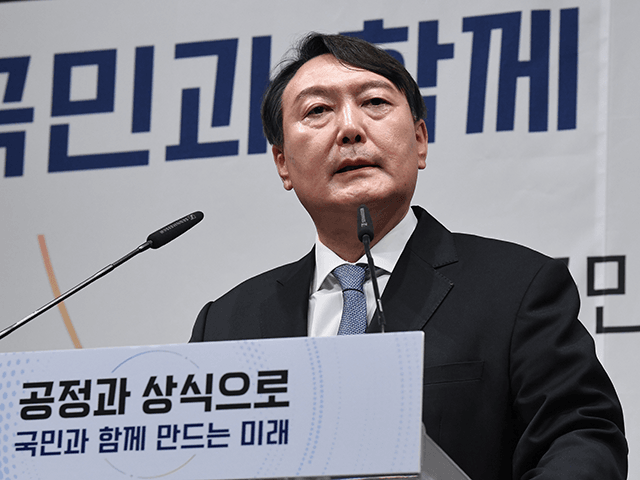South Korean presidential candidate Yoon Seok-youl of the opposition People Power Party (PPP) prompted outrage from the Korean left this week by accusing incumbent Moon Jae-in’s foreign policy of increasing anti-Chinese sentiment in the country.
Moon, of the far-left Democratic Party, has attempted to improve relations between Seoul and Beijing through yielding to pressure to antagonize Japan, decreasing pressure on neighboring North Korea to stop threatening a nuclear attack on the country, and, most recently, refusing to join any attempt at a boycott of the 2022 Beijing Winter Olympics. However, polling shows pro-China sentiment in the country has taken a nosedive during his tenure as a large number of citizens consider the Communist Party a top threat.
Yoon, a former top prosecutor in Moon’s administration who defected while accusing the ruling party of pervasive corruption, attempted to blame the Moon administration directly for the growing negative sentiment against China. By drifting Seoul away from America, Yoon argued, Moon had increased apprehension and distaste towards the Communist Party.
“The current government used policies skewed toward China, but most South Korean people, especially younger ones, do not like China,” Yoon said Tuesday.
“This government used policies skewed toward China and tried to act as a middleman between the U.S. and China, but it ended up with bad relations,” Yoon asserted.
Democratic Party representatives replied by accusing Yoon of fomenting bigotry through his observation. Former Democratic Party Justice Minister Cho Kuk compared Yoon to “a far-right YouTuber” and accused him of being “determined to ruin diplomacy and security,” according to the Korea Herald. Campaign representatives for presidential rival Lee Jae-myung dismissed Yoon’s comments as “shocking” and “low,” praising China’s relationship with South Korea.
“China is an important partner in security, economy and climate issues. How can Yoon, who so easily dismisses the relationship (with China), be in charge of South Korea’s diplomacy?” Kang Seon-ah, a Democratic spokesperson, said in a statement.
The PPP’s spokespeople replied that Yoon was right to condemn “the Moon government’s timid China policy” for creating “emotional conflict between younger generations of both countries.”
Polling supports Yoon’s assessment that positive popular sentiment towards China has deteriorated. The Korea Institute for National Unification, a government-run organization, published a poll this week finding that nearly 72 percent of South Korean consider China “the biggest threat to South Korea other than North Korea,” according to the conservative newspaper Chosun Ilbo. Japan came in at a distant second with 21.1 percent considering it the biggest threat to South Korea – a likely significant number as a result of Imperial Japan’s human rights atrocities against Korea during World War II.
“The proportion who regarded China as a threat were equally distributed across political leanings with 67.9 percent among progressives, 76.1 percent among conservatives and 70.3 percent among centrists,” Chosun detailed.
Elsewhere in the survey, the vast majority (71.3 percent) of respondents said South Korea should have nuclear weapons.
The sentiment has been brewing throughout the year. Another survey, published by Hankook Research and the Korean newsmagazine SisaIN this summer, found over half of South Koreans consider China “close to evil.” The distaste for China was generational – the poll showed younger Koreans disapproved of China more than of Japan despite the violent history of Japanese occupation that overshadows the bilateral relationship.
“Until now, hating Japan was such a part of Korean national identity that we have a common saying: You know you are a real Korean when you feel hateful toward Japan for no particular reason,” Jeong Han-wool, a chief analyst at Hankook Research, told the New York Times in August. “In our survey, people in their 40s and older still disliked Japan more than China. But those in their 20s and 30s, the generation who will lead South Korea in the coming decades, tipped the scale against China.”
While the Democratic Party condemned Moon, Lee, the party’s candidate, has escalated rhetoric against China, apparently feeling the pressure from Yoon.
“We must respond strictly and in a principled manner to illegal trespassing in our waters and fishing activities, and if necessary, seize and impound (the vessels),” Lee said on Thursday, responding to reports of the growing presence of illegal Chinese ships plundering South Korean waters. China has developed large fleets of illegal fishing boats that have caused widespread environmental devastation in such far-flung places as the shores of Argentina and the Galápagos Islands.
“Our territorial and maritime sovereignty should be respected, and the safety of our fishermen should be protected, along with our fishery resources,” Lee asserted.
South Koreans go to the polls in March. Yoon had maintained a slight lead over Lee for much of the race in most polls until this week. On Thursday, the news service Yonhap reported that a poll conducted this week by, among others, Hankook Research, found Lee enjoying an 11-point lead over Yoon.
“Lee gained 4 percentage points from last week, while Yoon lost 1 percentage point,” Yonhap noted.
Another poll by Munhwa Ilbo found Lee in the lead by a similar margin, but the percentage of support for both candidates was so low that undecided voters could easily swing the election in the other direction.
“A Munhwa Ilbo poll of 1,000 people this week found a mere 29.3-percent support for PPP candidate Yoon Seok-youl and 37.4 percent for ruling Minjoo [Democratic] Party candidate Lee Jae-myung,” Chosun Ilbo reported on Thursday. Nearly half of respondents in this poll said they supported placing a new party in power, suggesting that third-party candidates may be seeing elevated levels of support.
The swing towards Lee occurred rapidly. As recently as Monday, Yonhap reported that a Realmeter poll found Yoon enjoying a less than one-point lead against Lee, falling by four points in a week.

COMMENTS
Please let us know if you're having issues with commenting.